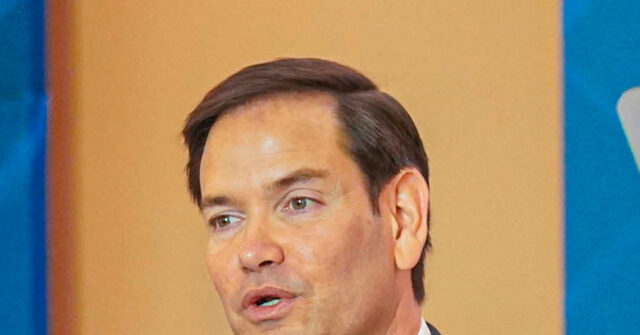The State Department announced sanctions Monday on six Chinese regime officials in Hong Kong and an unknown number in Tibet over years of human rights abuses against civilians in those occupied regions.
The Chinese government, both out of Beijing and Hong Kong, issued aggressive condemnations of the sanctions, announced by Secretary of State Marco Rubio, whom the Chinese government sanctioned and banned from the country in 2020. According to the Chinese Foreign Ministry, the sanctions in question are “groundless and unjustified.”
Beijing promised “resolute countermeasures” to the sanctions on Tuesday, without elaborating.
In two separate statements on Monday, Rubio accused the Chinese Communist Party of isolating the indigenous community of occupied Tibet and limiting foreigners from accessing the region, hampering America’s ability to provide critical diplomatic services to its citizens there. The Communist Party has spent years attempting to eradicate the indigenous culture of Tibet, particularly its language and religion, and refers to the region by the colonialist Mandarin name “Xizang.” Beijing, human rights activists have revealed, represses Tibetans through outlawing children practicing Tibetan Buddhism, forcing children into communist boarding schools away from family, and enslaving thousands of people, preventing the natural development of civil society.
The unnamed individuals targeted over repression in Tibet, Rubio explained, would face restrictions on any U.S. visas they request on the grounds that they have been “substantially involved in the formulation or execution of policies related to access for foreigners to Tibetan Areas.”
“For far too long, the Chinese Communist Party (CCP) has refused to afford U.S. diplomats, journalists, and other international observers access to the Tibet Autonomous Region (TAR) and other Tibetan areas of China,” Rubio noted, “while China’s diplomats and journalists enjoy broad access in the United States.”
“U.S. diplomats are also unable to provide services to U.S. citizens traveling in Tibet. This lack of reciprocity is unacceptable and will not be tolerated,” he emphasized.
The State Department did name the sanctioned individuals related to Hong Kong abuses. Those affected are Hong Kong Justice Secretary Paul Ting Kwok Nam, Police Commissioner Raymond Chak Yee Siu, Assistant Police Commissioners Dick Chung Chun Wong and Margaret Wing Lan Chiu, and two senior officials, Sonny Chi Kwong Au and Dong Jingwei.
The sanctions, the State Department explained, are in response to Chinese human rights abuses against Hongkongers related to the imposition of the “national security” law in 2020. When China took over Hong Kong in 1997, it agreed to a political mechanism known as “One Country, Two Systems,” in which Hong Kong would accept Chinese sovereignty in exchange for the Communist Party having no control over the capitalist legal system of the region. The “national security” law effectively ended “One Country, Two Systems” by outlawing – and imposing decade-long prison sentences for – the “crimes” of supporting secession, calling for foreign interference, “terrorism” vaguely defined, and “subversion of state power.”
The State Department accused China of using this law to persecute not only Hongkongers, but Americans on U.S. soil as well.
“Beijing and Hong Kong officials have used Hong Kong national security laws extraterritorially to intimidate, silence, and harass 19 pro-democracy activists who were forced to flee overseas, including a U.S. citizen and four other U.S. residents,” the State Department asserted.
The Hong Kong Free Press (HKFP) identified the American as pro-democracy activist Joey Siu, one of the 19 targeted by Chinese arrest warrants.
The Hong Kong sanctions ban the individuals in question from owning property in America and doing business with Americans.
The sanctions show the “Trump Administration’s commitment to hold to account those responsible for depriving people in Hong Kong of protected rights and freedoms or who commit acts of transnational repression on U.S. soil or against U.S. persons,” the State Department concluded.
The Chinese Foreign Ministry accused America of “blatant” interference in “internal” affairs with the sanctions. Foreign Ministry spokesman Guo Jiakun addressed the Tibet and Hong Kong sanctions separately.
On Tibet, Guo claimed that China had “never issued regulations restricting foreigners” from visiting before immediately proceeding to defend the restrictions he claimed did not exist.
“The Chinese government has taken some regulatory and protection measures in accordance with laws and regulations regarding foreigners entering the region. This is completely necessary,” Guo claimed. “Foreigners are welcome to visit, travel and do business in China’s Xizang region, but they must abide by China’s laws and relevant regulations.”
Guo went on to call the Hong Kong sanctions a “vicious attack” on China and the reasoning for them “groundless and unjustified.”
“The sanctions and the report constitute grave interference in China’s internal affairs, including Hong Kong affairs. China firmly rejects and strongly condemns this,” Guo affirmed. “We will take resolute countermeasures in response to the U.S.’s erroneous practice.”
The China-controlled government of Hong Kong issued a separate statement angrily accusing the United States of “barbarity” for imposing the sanctions.
Hong Kong, the statement read, “despises such so-called ‘sanctions’ and is not intimidated by such despicable behaviour.”
An official Hong Kong government spokesman separately condemned America for allegedly “ignoring the non-interference principle under international law, interfering with other countries’ internal affairs, grooming agents, instigating ‘colour revolutions,’” and other alleged misbehavior.
Follow Frances Martel on Facebook and Twitter.
Read the full article here
